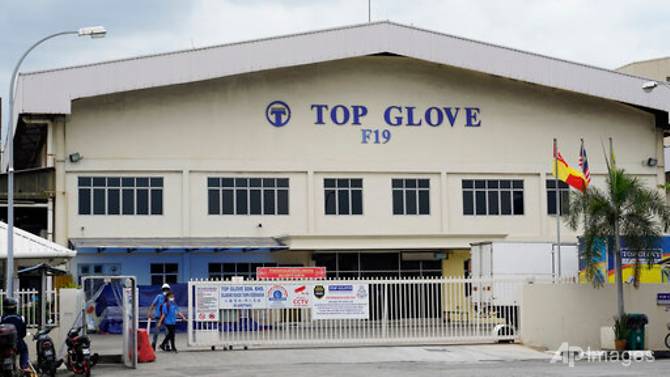MERU: Customers going to a hardware store off Jalan Teratai are not allowed to enter. Instead, they have to stand around a metre from the store entrance and tell the shop assistant what they are looking for.
-Advertisement-
The shop was in the limelight after local media earlier reported that it had put up a sign barring the entry of all Top Glove employees.
-Advertisement-
“That was last week, when the COVID-19 cases in Teratai was less than 100. We have a lot of Top Glove employees coming here to buy hardware,” the store’s proprietor, who did not want to be named, said.
“Then, after the cases started growing beyond 100 the same week, we decided to close entry to everyone to be safe.”
Residents and businesses around Jalan Teratai, Selangor, the new epicentre for Malaysia’s largest COVID-19 cluster, are on edge.
A large part of the residential area along Jalan Teratai, which mainly comprises double-storey houses converted into worker dormitories, were placed behind barbed wire, with Malaysian police and military manning checkpoints at the roads leading in and out of the areas placed under an enhanced movement control order (EMCO) since Nov 17.
Under the midday sun, CNA saw dozens of foreign workers line up under tents for screening by Health Ministry workers along this road which is lined with several Top Glove factories as well as worker hostels.
Top Glove is now the biggest contributor to Malaysia’s COVID-19 cases. Jalan Teratai has become the epicenter of the country’s largest new COVID-19 clusters.
The world’s largest rubber glove maker has shuttered 20 of its factories in an area outside Kuala Lumpur in stages since Nov 17 after nearly 3,000 workers tested positive for the coronavirus, with another eight facilities in the same area running below 20 per cent of capacity.
As of Thursday (Nov 26), there are 60,752 COVID-19 cases nationwide.
“IT HAS BECOME VERY QUIET”
“We didn’t know about workers being infected until last week,” said resident Kandasamy Padakat Hurian, 43 who lives in a house directly across a worker dormitory.
“When I went out to work at 7am on Monday (Nov 16), army trucks and the police were already here. By evening when I returned, the (barbed) wire was in place,” Mr Kandasamy recounted.
Prior to last week, Jalan Teratai would be busy in the evenings as petty traders and hawkers lined the road with stalls.
“When the government came and locked down the place, everyone fled. It has become very quiet,” he said
Ms Usha Ramanathan, a housewife living further down the road, was watching the foreign workers queue under tents for Health Ministry personnel to screen them.
“We were worried initially, and even now, my husband and I, we don’t go out if we don’t have to. We just take away food or cook at home.
“We sometimes shop at the same places as the foreign workers, so there was a bit more worry, especially in the beginning when the government placed the dormitories under lockdown,” she said.
SHORT-TERM LOSSES
About 100m from the locked-down dormitories, the owner of a bakso (meatball) shop along Jalan Kenangan which connects with Jalan Teratai, said that before the strict lockdown, workers would come around for meals.
“Right now, we feel worried and afraid. You cannot see the virus, and you are worried about what happened before and if an infected worker had visited your stall,” the proprietor, who only wanted to be known as Siti, said.
“But at the same time, we also feel a little safer, because they’ve put the hostels under lockdown and everyone is made to undergo testing,” she added.
Ms Siti said there has been some loss of income in the short-term, as no workers can visit her eatery now.
“We did worry about the income dropping a little, but it is not a big problem. Now you feel safer after the place is locked down,” she added.
5,700 WORKERS SCREENED
On Wednesday, Top Glove issued a statement stating the company’s actions to mitigate the COVID-19 outbreak among its worker dormitories.The company said it has completed screening of some 5,700 workers affected by the EMCO instituted on Nov 17.
“Mass screening of the remaining Top Glove employees in the area is expected to be completed by the end of the week,” said the statement, adding that since the start of the EMCO, employees had been delivering free food and other essentials to their colleagues three times a day.
The company also assured that its glove products were not contaminated. It said this was impossible due to the production and delivery processes the gloves underwent before reaching customers.
“The production process is also highly automated with minimal human intervention required,” Top Glove stated, adding that those tasked with packing were in full personal protective equipment, including suits, gloves, face-shields and masks with no direct contact with the final product.
-CNA

